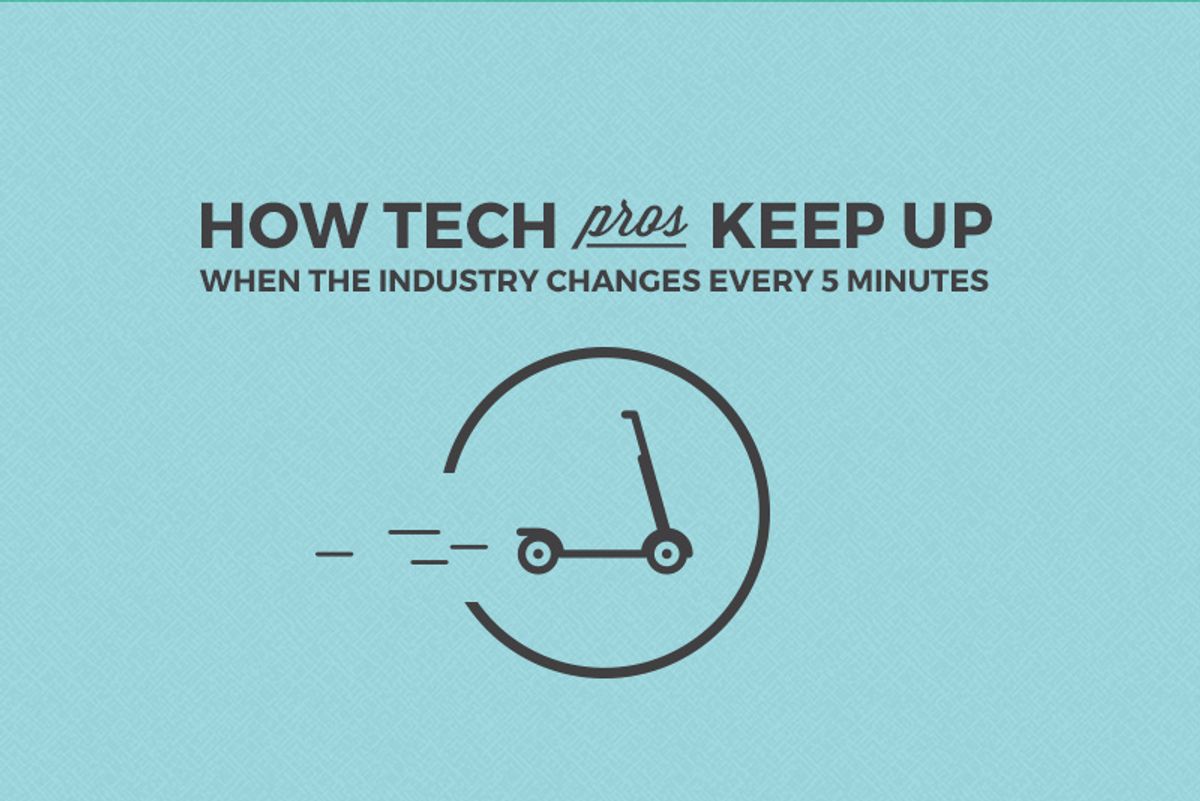A version of this article previously appeared on Skillcrush, an online education program for creatives, thinkers, and makers that gives total tech newbies the tools to make major career changes.
Cameron Chapman, Skillcrush
Sometimes it seems like new technologies, techniques, and standards get released on an almost daily basis, making the tech industry dizzyingly fast.
For someone new to the industry, keeping up can feel puzzling—or nearly impossible. How do you stay on top of changes that happen all the time, especially ones that can directly impact the work you do and what your boss (or clients) expect?
I talked to web designers, developers, and other techies to find out what they do to keep up. The answers are more straightforward than you might expect.
Follow Influencers on Social Media
Almost everyone I spoke to said one of the best ways to stay on top of innovations in the industry is by following influencers on social media. Setting up custom lists (or following lists others create) on Twitter can take a lot of the legwork out of finding the news you need to keep up with.
Watching what influencers are doing in their spare time is a great way to know what might be coming next. "Things like 'Initial Coin Offerings' and AI seem like moonshots, but the smartest people I know work on those subjects in their free time. That makes me confident that some big businesses will emerge in these areas," says Philip Thomas, co-founder and engineer at Moonlight. Pay attention to what gets developers excited and you'll know where to look for the next big thing.
If you're looking for whom to follow on Twitter, try Skillcrush's Women in Tech list—our favorite influencers and experts.
Spend Time Reading Every Day
"Read. Read. Read." That's how Kate Chan, a full-stack marketer at BlueFox.io, stays up to date on changes in the industry. She sets aside time daily to read about tech, insuring she won't fall behind. James McCarthy, CEO and lead web developer at Boldtask, is specifically a fan of A List Apart for long-form articles that keep him up to date. We also love:
Staying in the Know Doesn't Mean Falling for Trends
Nathan Kontny, CEO of Highrise (a spin-off of the wildly popular Basecamp project management software), warns against the appeal of quick fads at the expense of staying grounded. "I think keeping up with changes is far overrated. We're better served by studying history and how companies that are decades old, if not older, have made customers happy. It's a fool's game to keep chasing fads and responding with knee-jerk reactions."
It's a fair point and one that's well evidenced. He uses Google Wave as one such example, touted as a revolutionary product that would change how we all work together. Instead, Wave was dead within three years due to lack of interest despite all the hype of its release.
The moral here: Focusing on user needs can allow you to create successful projects without falling for fads.
Skip the Four-Year Degree
As Erik Zuuring, a 10X programmer who dropped out of college, told Mashable, "One of the biggest issues with post-secondary education in the technology industry is its ability to keep a curriculum current and at the cusp of technology…Just in the web-sphere, trends and technology change on a monthly basis."
We see this proven over and over again at Skillcrush: You don't need a four-year degree to find success. What you learn in your first semester might be obsolete by graduation day. Learning in a faster-paced environment sets you up to actually start working in the tech industry in way less than a quarter of the time it would take to get a degree.
Want to get started in the tech industry right away? Check out the Ultimate Guide to Coding for Beginners for a step-by-step plan to launch your tech career.




